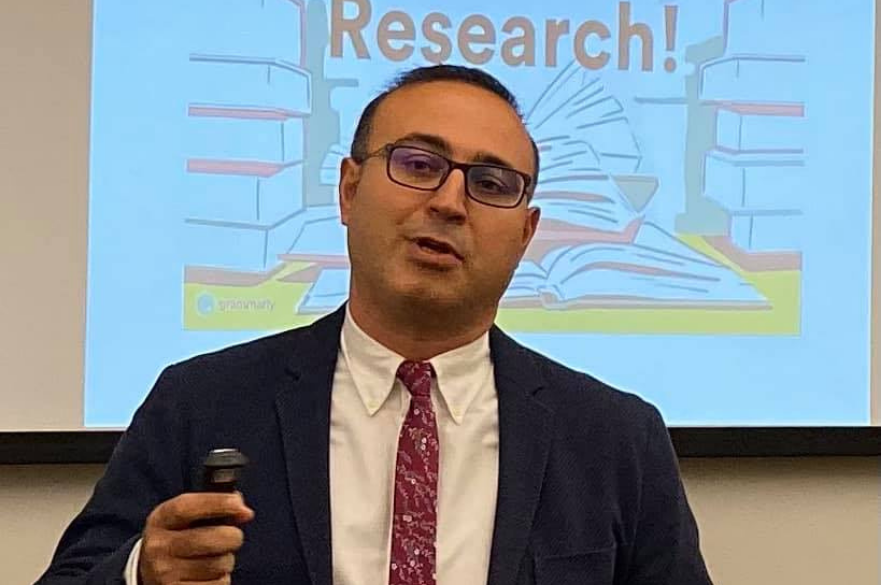People who dwell on poor service more likely to spread the word online
People react to customer service failures in three ways, impacting on whether they share their experience online, according to new research which suggests that companies need to rethink how they respond to individual customers.
By Helen Breese | Published on 12 June 2023
Categories: Press office; Research; Nottingham Business School;

International and multidisciplinary researchers from Nottingham Business School (NBS), part of Nottingham Trent University, UK; The University of Edinburgh, UK; University of Canterbury, New Zealand; and University of Padua, Italy; questioned more than 880 people on their experiences of services failures within the tourism and hospitality industry.
It is the first study to demonstrate that the coping style adopted by customers can impact on how they reflect on their experience, and whether they share their complaints via electronic word-of-mouth (e-WoM). The analysis also has implications for how organisations deal with customer complaints.
Findings revealed three main coping strategies - customers who respond ‘actively’ put the blame on the provider; ‘expressive’ complainers wish to demonstrate their anger; and those who have a ‘denial-based’ reaction completely disengage with the organisation.
The respondents were also sorted into four overlapping clusters depending on how they adopted or avoided each of these strategies; how they experienced anger, such as frustration, irritation, annoyance, and distress; and how this impacted on whether they ruminated on the experience.

Professor Babak Taheri
When looking at how these coping mechanisms effect whether customers shared their experiences online, it was found that better-educated consumers were less likely to talk about their experience publicly. However, customers who used expressive coping, were irritated, and lingered on an incident, replaying it over and over again in their minds, were more likely to use online channels to warn others.
Babak Taheri, Professor of Marketing and part of the Marketing and Consumer Studies Research Centre at NBS, said: “Service failure can negatively affect the wellbeing and resilience of consumers. People inevitably react emotionally to poor customer service and, when they dwell on this, they often cope by sharing their complaints online, damaging the reputation of the provider.
“However, this is not the default reaction of all customers, and our research suggests that responding in a one-size-fits-all manner is not effective. Organisations need a better understanding of how coping strategies interact and shape consumer reactions so they can speak to specific segments and solve problems in a way that suits the individual customer.”
The study outlines examples of service recovery strategies, such as free-phone numbers and online complaint portals available for ‘expressive’ customers to vent their frustrations; proactive customer engagement action to identify problems among ‘denial’ consumers to prevent them moving to another provider; and timely, effective remedial action, such as taking responsibility, quick response times and financial compensation, to appease ‘active’ customers.
It also highlights the use of social media as an opportunity for service providers to rebuild customer trust post-failure. These online platforms can be managed strategically to address service failures quickly, personalise service recovery, and respond to different forms of service failure in a more bespoke, effective manner.
Professor Taheri added: “Customer service teams should be trained and supported to act quickly and empathetically. They need to be able to employ bespoke solutions to stop consumers’ initial complaints from developing into more damaging action, such as negative online reviews.”
The full paper Gannon, M., Taheri, B., Prayag, G., & Disegna, M. (2023). Coping, Rumination, and Electronic Word-of-Mouth: Segmenting Consumer Responses to Service Failure via Fuzzy Clustering will be published in the Journal of Business Research.
For further information on the Marketing and Consumer Studies Research Centre at Nottingham Business School visit the website, Twitter or LinkedIn.
Notes for Editors
Press enquiries please contact Helen Breese, Public Relations Manager, on telephone +44 (0)115 848 8751, or via email.
About Nottingham Business School at Nottingham Trent University
Nottingham Business School (NBS) at Nottingham Trent University (NTU) is a leader in experiential learning and personalisation of business, management and economics education and research, combining academic excellence with positive impact on people, business and society. NBS has an unrivalled level of engagement with business, public and voluntary organisations. With more than 8,500 students, NBS is also one of UK’s largest business schools.
NBS is Quadruple+ Accredited by EQUIS, AACSB, EFMD BA for International Business, which are globally recognised hallmarks of excellence and quality for business education. NBS is also accredited by Small Business Charter, providing support and development for SMEs. The school is also a PRME Champion and held up as an exemplar and beacon by the United Nations Principles of Responsible Management Education (PRME).
About Nottingham Trent University
Nottingham Trent University (NTU) received the Queen’s Anniversary Prize for Higher and Further Education in 2021 for cultural heritage science research. It is the second time that NTU has been bestowed the honour of receiving a Queen’s Anniversary Prize for its research, the first being in 2015 for leading-edge research on the safety and security of global citizens.
The Research Excellence Framework (2021) classed 83% of NTU’s research activity as either world-leading or internationally excellent. 86% of NTU’s research impact was assessed to be either world-leading or internationally excellent.
NTU was awarded The Times and The Sunday Times Modern University of the Year 2023 and ranked University of the Year in the Whatuni Student Choice Awards 2023. It was awarded Outstanding Support for Students 2020 (Times Higher Education Awards), University of the Year 2019 (Guardian University Awards, UK Social Mobility Awards), Modern University of the Year 2018 (Times and Sunday Times Good University Guide) and University of the Year 2017 (Times Higher Education Awards).
NTU is the 5th largest UK institution by student numbers, with approximately 40,000 students and more than 4,400 staff located across five campuses. It has an international student population of 7,000 and an NTU community representing over 160 countries.
Since 2000, NTU has invested £570 million in tools, technology, buildings and facilities.
NTU is in the UK’s top 10 for number of applications and ranked first for accepted offers (2021 UCAS UG acceptance data). It is also among the UK’s top five recruiters of students from disadvantaged backgrounds and was the first UK university to sign the Social Mobility Pledge.
NTU is ranked the second most sustainable university in the world in the 2022 UI Green Metric University World Rankings (out of more than 900 participating universities).